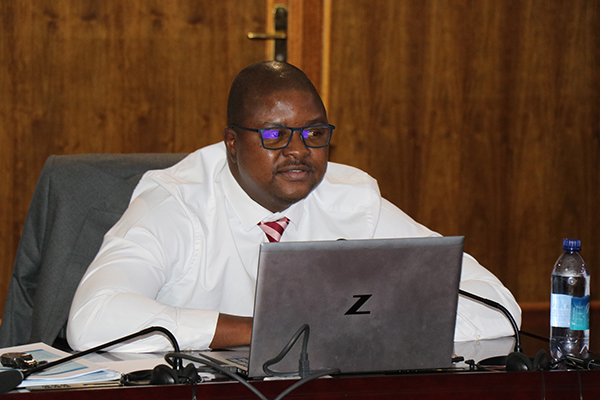George Sanzila
The independence of the Electoral Commission of Namibia (ECN), political boundaries and non-compliance by some political parties to the Code of Conduct, are some of the major challenges that are hampering the activities of the commission.
This came to light on Thursday when the ECN appeared before the Parliamentary Standing Committee on Constitutional and Legal Affairs to share information on its activities, successes and challenges.
According to the ECN chief electoral and referenda officer, Theo Mujoro, the commission is at an advanced stage to finalise proposed amendments to the Electoral Act to enable the operationalisation of its independence in accordance with Article 94B of the constitution with final consultations expected to be completed at the end of this month.
“The final round of consultations with electoral stakeholders is envisaged for end of November 2022 after which the Bill will be presented to the minister of Urban and Rural Development for onward processing,” noted Mujoro.
He further noted that even though Article 94B of the constitution clearly provides for the commission’s institutional independence, paradoxically, the Public Service Act considers the institution as a government agency, an anomaly he says needs to be corrected.
Mujoro noted that ECN relies heavily on government policies and frameworks for its administration as it is currently regarded as an agency of government. As a result, the status quo has adversely affected the commission due to lack of budgetary control and was therefore counterproductive given the immense responsibility of managing elections.
“The classification as a government agency puts the ECN at the level of other state institutions and that does not align well with the provision of the constitution. Running elections is a different process all together as we have to follow certain timeframes that might not run concurrently with the timeframes of government systems. In terms of recruitment of staff, we are still subjected to the same processes and procedures. Independence implies having unhindered access to human and material resources and having access to sufficient funds to execute the electoral mandate,” said Mujoro.
Confusion with regard to political boundaries of constituencies also came under the spotlight as it became apparent that some voters often end up casting mistaken votes in constituencies they do not belong and thus presenting risks of rejected votes and potential election disputes. As a result of this, according to Mujoro, the ECN has partnered with other stakeholders to raise awareness including plans to consult with the Delimitation Commission, which is responsible for boundaries.
“We have incidences where a voter resides in a particular constituency adjacent to another but because the constituency office of that particular voter is located far away than the neighbouring constituency, such a voter then registers in a wrong constituency due to the distance. This creates problems for us and we have increased our voter education campaigns to address this particular challenge,” he said.
Lack of compliance by political parties and associations to sections 139, 140, 141 and 158 on the submission of audited financial statements has also continued unabated, despite numerous reminders and workshops aimed at reiterating the importance of compliance, Mujoro revealed, adding that the commission was contemplating instituting legal action as a last resort.
Following queries from the committee on electronic voting machines, Mujoro further noted that due to the 2020 Supreme Court ruling that compelled the ECN to use the EVMs only if they are accompanied by the voter verification paper trail technology, the commission has since suspended their use and has instead resorted to the manual voting system.
He noted that EVMs were acquired after wide ranging consultations and that the reason why the accompanying verifying paper trail technology was not procured at the time was not due to ignorance but that such technology did not exist at the time.
He reiterated the importance of a paper trail and added that the current EVMS in the commission’s possession were not compatible with the available technology. He, however, hailed electronic voting, stating that during the previous elections, EVMs proved to be efficient and cost effective even though there were minor challenges. Speed, accuracy of voting and counting process, elimination of spoilt or rejected ballots and reduction to the cost of using paper are some of the advantages that have been identified.


